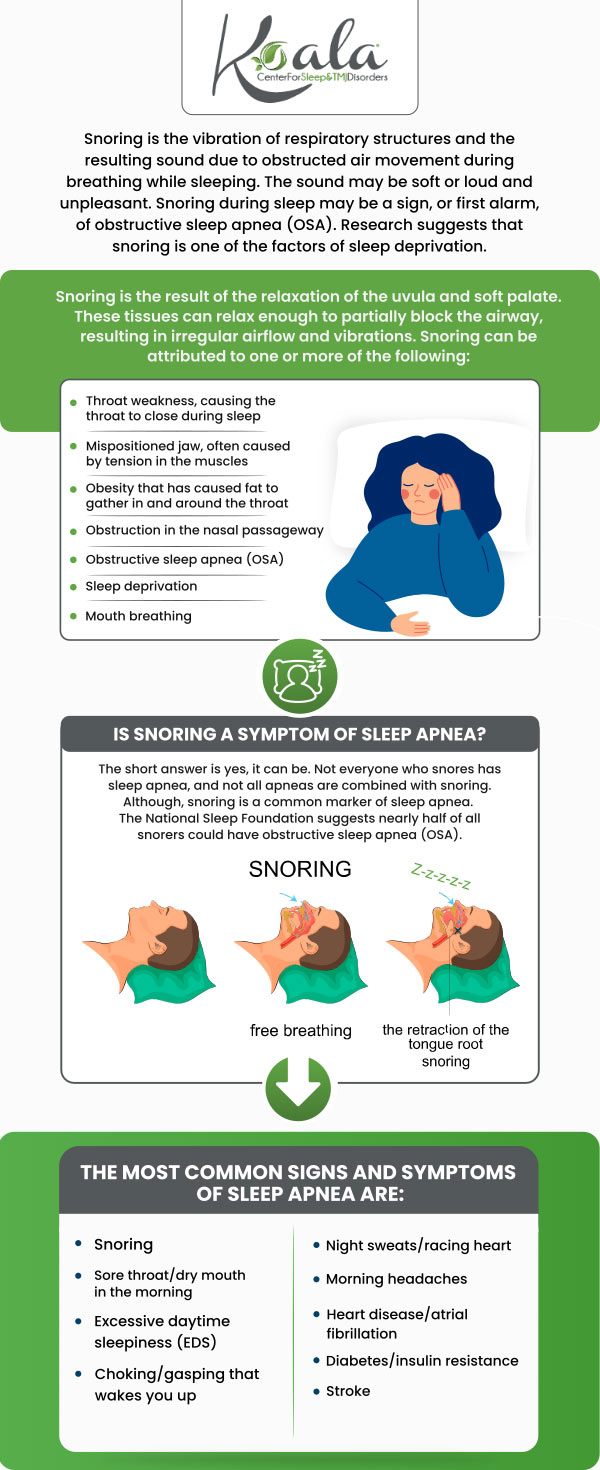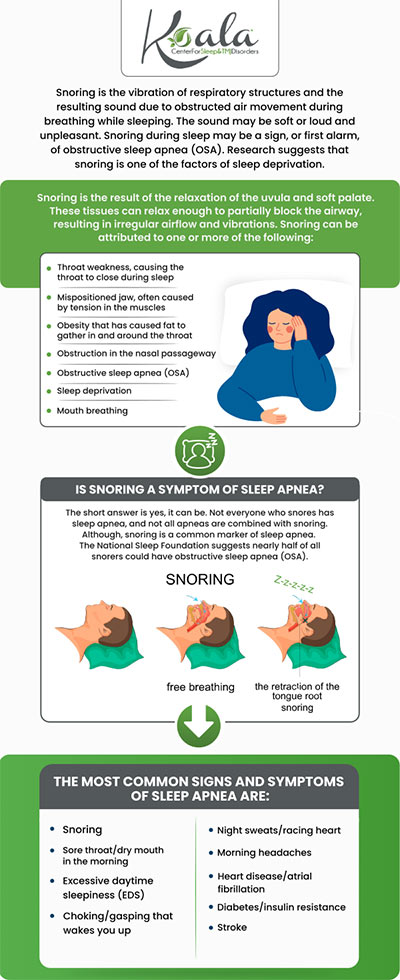Why Am I Snoring All of a Sudden?
If you have suddenly started snoring, come to Koala® Center For Sleep & TMJ Disorders for treatment. For more information, call us or visit us online to book an appointment. We have convenient locations across the U.S. in Bloomington IL, Peoria/Dunlap IL, El Paso TX and Wausau WI.




Table of Contents:
Why do I suddenly start snoring?
What is the most common reason for snoring?
Does stress cause snoring?
When should I be worried about snoring?
Snoring is a sound caused by the vibration of soft tissues in the nose and upper airways when breathing during sleep. The area most affected by snoring vibrations is the tissues of the soft palate. The soft palate is made up of the muscular tissue at the back of the throat, near the roof of the mouth, and includes the uvula and other muscles that play essential roles in breathing, speaking and swallowing. The soft palate separates the mouth from the nasal cavity. When these soft tissues at the back of the throat are relaxed and infirm during sleep, they may fall into the space where the air passes through. Snoring occurs when air is forced to pass through tissue obstruction in the soft palate during sleep. It can also occur in sudden-onset breathing problems and in the case of sleep apnea where the airway becomes completely blocked and the person stops breathing.
Snoring is caused by a narrowed airway during sleep, which leads to a vibration of the soft tissues in the mouth, throat and upper airway. When we are awake, the muscles in the airways are active, which prevents them from closing. However, when we sleep, the airway muscles become relaxed; coupled with the effects of gravity, this can cause the air passages to close or become partially obstructed. As a result, the lax muscles vibrate when air moves past them; this is exacerbated when the airways are partially obstructed as air is more forcefully pushed through and at a faster rate, resulting in more violent vibrations and louder snoring. Factors that influence the likelihood of snoring include:
– Enlarged uvula
– Physical anatomy
– Being overweight or obese
– Drinking alcohol before bed
– Allergies and infections
– Sleeping in a supine position (face up)
– Poor bite
While men are more likely to be snorers than women, snoring is also quite common in the female population. Snoring also tends to worsen with age.
Snoring is very common. Anyone can snore at some point in their life, although it is more common in men over the age of 50 who are also overweight or obese. Snoring risk factors include:
Age — Because muscle tone decreases as we get older, causing airways to constrict, snoring is more common with age.
Alcohol and Sedatives — Alcoholic beverages and certain medications, particularly ones that impact the central nervous system, relax muscles, which can restrict airflow in the mouth, nose and throat.
Anatomy — Certain anatomical features, such as a long soft palate, enlarged adenoids, tonsils or a large tongue, can make it hard for air to flow through the nose and mouth, increasing the chance of snoring.
Gender — Snoring is more common in men.
Family History — Snoring runs in families. People who have a parent who snores are more likely to snore as well.
Overall Health — Nasal stuffiness due to allergies or an upper respiratory infection block airflow through the mouth and nose.
Pregnancy — Due to hormonal changes and weight gain, pregnant women are more likely to snore.
Weight — Snoring and sleep-related breathing disorders are more common in people who are overweight or have obesity as there is more weight and therefore pressure placed on the airways, leading to breathing restrictions.
Stress can be a contributing factor when it comes to snoring as it can make it harder to fall asleep or get a good night’s rest. Furthermore, in response to stress, the brain releases hormones such as norepinephrine and cortisol; these hormones increase tension, making restful sleep challenging and potentially leading to airway obstructions.
In the vast majority of cases, snoring is nothing to worry about, especially if it only occurs occasionally, but also in some cases of regular occurrences. However, snoring is considered potentially deleterious to one’s health when it is associated with sleep apnea, which can cause pauses in breathing during sleep. Moderate to severe cases of sleep apnea must be treated in order to prevent dangerous complications, such as brain damage due to decreased oxygen levels.
*It is important to note that not all patients with sleep apnea snore. If a patient experiences the outward signs of daytime tiredness, fatigue, never feeling rested or witnessed times when breathing stops during sleep, even with no snoring, it is important to see medical attention.
If you or someone you love has started snoring seemingly out of the blue, the sleep team at Koala® Center For Sleep & TMJ Disorders can help you identify the cause and improve your quality of sleep. Call us today to book an appointment for snoring treatments, or visit one of our locations: we serve patients from all across the United States, and have clinics in Mishawaka IN, Bloomington IL, Peoria – Dunlap IL, Wausau WI and El Paso TX. We look forward to serving you!

Additional Services You May Need
▸ KoalaKIDZzz®
▸ Sleep Apnea
▸ Snoring
▸ TMJ Disorder
▸ Fatigue
▸ Sleep Disorders
▸ Weight Loss
▸ CPAP Alternative
▸ Oral Appliances




